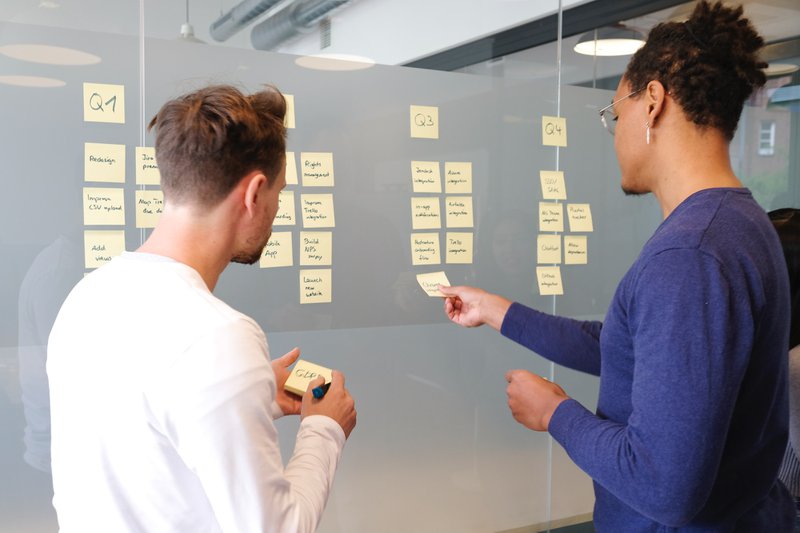
October 5, 2021
Agile Software Development: What It Is And What It Isn’t
When working on software development, changes to the project are inevitable. From tweaking and building software components to spur-of-the-moment changes from clients, many software development companies have turned to Agile software development to tighten up their reaction times and business efficiency.
Since its official inception in 2001, Agile software development has been making the rounds in businesses worldwide. As the “new kid on the block,” it has replaced some older project management processes like the Waterfall method. However, just because it’s a newer process doesn’t mean it will fit your business model. There are situations where Agile software development will be perfect for your business and others may want to consider other processes.
What is Agile Software Development?
Agile is a project management approach that helps software development teams provide deliverables in a faster way. Instead of delivering projects in one single launch (Like the Waterfall method), the Agile process breaks projects down into smaller, more manageable increments. These smaller increments offer software development teams the flexibility to present the best product possible within a limited period.


What Makes Up The Agile Methodology?
The Agile methodology was built to provide more flexibility and the need to accommodate faster software development speeds. Created with four key values in mind, these values make up what Agile is as a process. These key values are the main components that are the building blocks of this management process:
Individuals And Interactions Over Processes And Tools
This key value focuses on providing communication at all times. It’s the team’s responsibility to manage the interactions between each other and the client when necessary.
Working Software Over Comprehensive Documentation
This key value makes Agile a process that takes it away from the pages and pages of documentation about every project and focuses on actual results instead. The primary duty of Agile is to complete the deliverable as identified during each sprint – not just to deliver a document talking about what was completed.


Customer Collaboration Over Contract Negotiation
Communication and customer involvement is an essential key value of Agile. The idea is that if the customer is kept in the loop during the entire software development process, they never feel like they were taken advantage of and had their finger on the pulse from the beginning to the end.
Responding To Change Over Following A Plan
What makes Agile so different than other development plans is its ability to change and be flexible. With customers so involved in the process, there are always opportunities for change or additional tweaks here or there. This key-value focuses on the fact that the project managers and their teams are able and willing to transition and adapt to deliver any changes at a moment’s notice.
What Isn’t Agile Software Development?
Agile isn’t a free-for-all, and it isn’t perfect for every organization. While some companies strictly rely on the Agile methodology, others may not be ready for this framework. Some indications that Agile software development isn’t suitable for your business include:
- Agile can be costly: It can be challenging to perfectly predict cost, time, and resources at the beginning of a project.
- Your team isn’t interested in adopting Agile: If your team is already set up within a waterfall system or is comfortable with another type of management, they may be resistant to change.
- You lack the education/leadership to implement Agile: The lack of training or education about the Agile processes makes it challenging to implement.
- Your software development isn’t suited for Agile sprints: Smaller projects can get overcomplicated by Agile sprints, and conversely, larger projects may need more time than agile sprints provide.


To Agile or Not To Agile
Many software development companies use the Agile framework for their different projects to help with learning, planning, and collaboration. They work within the framework of incremental delivery and thrive within the guidelines that Agile has created. However, sometimes Agile might not be the best fit for your business.
Let Us Help
At Flint Hills Group, we use the Agile methodology to get your project complete. We found that Agile is the right process for us, and we pride ourselves on our excellent customer service and timely delivery of software projects. With FHG, our group of highly experienced, US-based software developers will provide your business with the innovative solutions it needs to compete.
Our team is both highly communicative, collaborative, and receptive to offer solutions built to your specific requirements. We work closely with you to develop and grow your products from offering a single developer to supplement your team to working with an entire FHG team and project manager. Contact us to see how we can help you succeed across all aspects of your business.
Julie Simpson
Technology Enthusiast
Julie Simpson is a freelance writer, SEO consultant and technology enthusiast from Lucedale, Mississippi. When not writing articles and updating websites, she can be found working on her 7-acre farm with her husband, daughters, and assortment of plants, chickens, dogs, cats, and sheep.




Julie Simpson
Technology Enthusiast
Julie Simpson is a freelance writer. SEO consultant and technology enthusiast from Lucedale, Mississippi. When not writing articles and updating websites, she can be found working on her 7-acre farm with her husband, daughters, and assortment of plants, chickens, dogs, cats, and sheep.

